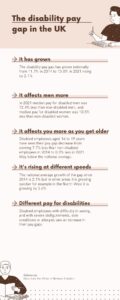The disability pay gap is accelerating quicker in the North-West than the national average, according to the latest figures from the Office of National Statistics.
According to the report, the disability pay gap has grown nationally from 11.7% in 2014 to 13.8% in 2021 rising by 2.1%. In the North-West, however, it is accelerating much quicker going from 9.8% to 13.4% rising by 3.6%.
The report found:
- In 2021 median pay for disabled men was 12.4% less than non-disabled men, and median pay for disabled women was 10.5% less than non-disabled women.
- Disabled employees who were limited a lot in their day-to-day activities consistently had a wider pay gap to non-disabled employees without a long-lasting health condition (19.9% less in 2021) compared to disabled employees whose day-to-day activities were limited a little (12.1% in 2021).
- Disabled employees with difficulty in seeing, and with severe disfigurements, skin conditions or allergies saw an increase in their pay gaps. For those with difficulties in seeing it increased from 0.0% to an adjusted 10.5%, and those with severe disfigurements, skin conditions or allergies it increased from negative 2.8% to an adjusted 6.2%.
- Disabled employees aged 16 to 19 years have seen their pay gap decrease from earning 7.7% less than non-disabled employees in 2014 to 0.3% less in 2021. Pay for this age group is more likely to be affected by changes to the minimum wage legalisations than other age groups, which could help explain the reduction in this gap.
Liverpool based Daisy Inclusive UK is a disability-led charity has been providing support for young people with disabilities and families of people with disabilities for the last two decades.
CEO and Founder Dave Kelly said: “The more vulnerable you are, the more the likelihood is that you will have a low wage for sometimes doing the same job as others. I highlighted this 20 years ago.
“I was talking to the boss of a company training disabled people and I said “How many, who are working age, have got a job over £15,000 per year?” and the answer was none.
“Does that mean any disabled person isn’t capable of becoming a manager or a CEO? That’s why I, when I went blind 30 years ago, I was told the only job I’d get is a basket weaver. So, I decided to go out there a create a charity that will give opportunity and do what should be done.”

Mr Kelly says that businesses shouldn’t look at taking on disabled employees as taking a risk: “The untapped potential of disabled employees is amazing. The potential that is out there but not given the opportunity.
“We are part of the Disability Confident Scheme which is with the DWP and we’re the first charity on Merseyside to actually become one of the leaders of that. Which means were pro active when it comes to disability and pulling people with disability, giving opportunity, so we’re really proactive when it comes to this inequality.”
“It’s the employers who don’t understand disability, it’s the stereotypical deep-seated thoughts they have for disabled people- that they’re going to be off sick all the time, it’s going to cost thousands and thousands of pounds to build lifts and to change the building it all things that they perceive- this is all untrue.
“In fact, disabled people are more likely to not be sick and be off work than non-disabled people.”
Kelly cites the government’s Access to Work programme, which helps pay for equipment and changes to make a workplace suitable for a person with a disability as an area employer are largely unaware of: “No one knows about Access to Work. That’s been going on for years that pays for any things that need to be done to employ disabled people which would cost the business nothing.”












